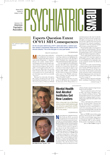David Osser, M.D., immediate past president of the Massachusetts Psychiatric Society (MPS), and other MPS members are helping state officials develop a new strategy to address the rising cost of psychotropic drugs covered by Medicaid.
Osser told Psychiatric News, “We need to prescribe responsibly as psychiatrists and as citizens of the state. Medicaid budgets are under great duress. Cost-effective prescribing for psychotropic drugs can help avert cuts in other areas of the Medicaid budget.”
An article in the October issue of the APA journal Psychiatric Services describes the background of the effort and assumptions of the officials who initiated the activity.
The article’s authors are Ken Duckworth, M.D., deputy commissioner for clinical and professional services in the Massachusetts Department of Mental Health, and Annette Hanson, M.D., medical director of the Massachusetts Division of Medical Assistance.
According to the article, Medicaid pharmacy expenditures for the state’s Medicaid population of 940,000 reached $950 million in Fiscal 2002. Forty-seven percent of that figure was spent on medications considered to be primarily psychotropic.
In a report of a September survey by the Kaiser Commission on Medicaid and the Uninsured, 44 states cited increased spending on prescription drugs as one of the three most significant factors increasing Medicaid costs (see story on
page 4).
States have responded to this assault on their Medicaid budgets with cost-saving measures such as limiting the number and amount of prescriptions per month and imposing tiered copayments.
The most publicized effort at cost-containment occurred in Michigan, where the legislature established a preferred drug list that requires prior authorization if a drug is not on the list. The effort was budgeted to generate $42 million in savings and is under challenge in state and federal courts (Psychiatric News, September 20, August 2, June 21, April 19, and January 18).
Massachusetts Method
One of eight assumptions that Duckworth and Hanson describe is that “requiring prior authorization for psychiatric medications on the basis of cost alone, as has been attempted recently in some states, is a poor strategy. It is not based on clinical reasoning and has been reported to increase costs in other parts of the system.”
Instead, state officials convened a work group including MPS members, psychopharmacologists, representatives of state agencies, and the Alliance for the Mentally Ill to evaluate clinical practices in Massachusetts and make recommendations for managing the psychiatric portion of the pharmacy budget.
Osser told Psychiatric News, “We came up with three prescribing practices that are costly but whose validity is not supported by a review of the literature.”
They are routine and concomitant use of more than one atypical antipsychotic for more than a reasonable crossover period (60 days), use of two selective serotonin reuptake inhibitors (SSRIs) for more than 60 days, and concomitant use of five or more psychotropic medications.
Psychiatric Services reports that the work group found that as of this past January, more than 2,200 adults received more than one atypical antipsychotic at a time for more than 60 days, at a cost of $24 million; that almost 5,000 Medicaid recipients were taking more than one SSRI for more than 60 days, at a cost of more than $4.5 million; and that more than 1,100 MassHealth recipients were receiving five or more psychiatric medications in January, often from multiple prescribers. (MassHealth covers recipients of Medicaid and of benefits from the Children’s State Health Insurance Program.)
State Notifies Psychiatrists
State officials sent a letter and supporting materials in June to members of MPS and other psychiatrists as a first step to educate them about the lack of clinical evidence for the prescribing practices identified by the work group and to notify the psychiatrists about the threat to Medicaid posed by rising pharmaceutical costs.
In August they sent a second letter to the 75 psychiatrists whom they had identified as the most frequent users of the three prescribing practices. They notified them of their status and said that prescribing patterns would be analyzed again in the fall.
Duckworth and Hanson wrote in Psychiatric Services that they will not require alteration of any regimens without allowing ample time for evaluation, consultation, and establishment of new approaches.
Osser said, “It usually isn’t advisable to change the drug regimen of a patient who is stable. But we think this educational effort will affect decisions about prescribing for new patients, and we hope to see a gradual reduction in costs.”
Both the MPS and state officials are planning further educational activities to promote the use of evidence-based prescribing practices. On December 14 the MPS will devote its annual psychopharmacology conference to “Polypharmacy: Evidence-Based versus Clinical Experience.”
The state plans to offer educational programs to consumers and family members.
Anthony D’Agostino, M.D., chair of the Subcommittee on Pharmacy Benefits Management (PBMs) of APA’s Managed Care Committee, told Psychiatric News, “We need to be aware that the cost of prescription drugs will be an issue in order to behave responsibly. This appears to be the most rational approach I’ve seen in its effort to combine evidence-based prescribing with cost containment.”
Psychiatr Serv 2002 53 1231
